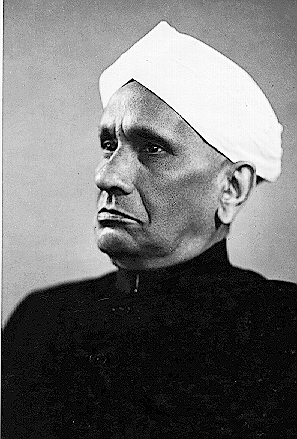 Known
for his Raman Discovery.
Known
for his Raman Discovery.
Raman was born on Nov 7, 1888, in Tiruvanaikkaval, Madras. He attended the A.V.N. College and then the Presidency College of the University of Madras, from where he received his B.A. degree. In 1906, at the age of eighteen, he published his first paper in the Philosophical Magazine. He received his M.A. degree in 1907 with top honours. Higher studies in England were ruled out on medical grounds and opportunities for a research career in India were nil. so he decided to join the coveted Indian Civil Services (ICS). To join the ICS, one had to appear for an examination in England, so he took the next best bet, the Financial Civil Service (FCS). In 1907, he married Loksundari and that very year was posted as Assistant Accountant-General in Calcutta. He worked for ten years in the Indian Finance Department, and even there continued his research and published no fewer than 30 papers.
In 1917, Raman was offered the Palit Chair for Physics by Sir Asutosh Mookerjee, the Vice-Chancellor of the Calcutta University. Even thouhgh it meant a huge pay cut (from Rs 1100 to Rs 600), Raman resigned from his Goernment job and joined the University of Calcutta.
In 1921, Raman represented the University of Calcutta at the British Universities Congress at Oxford and delievered a lecture before the Royal Society of London on the theory of stringed instruments. In 1924, he was elected Fellow of the Royal Society, London and was knighted by the British Government in India in 1929
While at Calcutta, he made significant contributions to the field of vibration and sound, musical intruments, ultrasonics, diffraction, meterological and colloid optics, photoelectricity, x-ray diffraction, magnetism, dielectrics and Raman effect.
In 1930, he received the Nobel Prize in physics for the discovery of the Raman effect thus becoming the first Asian to receive a Nobel Prize in Science.
In 1932, following personal clashes with Saha, Raman resigned from the University of Calcutta and assumed the Directorship of the Tata Institute of Sciences (now known as the Indian Institute of Science), Bangalore.
In 1947, Raman founded an institution of his own, near the offices of the Indian Academy of Science, which he had also founded in 1935.
Raman died on Nov. 21, 1970, at the age of 82, and was cremated in his rose garden.